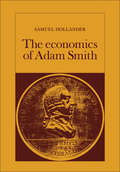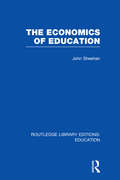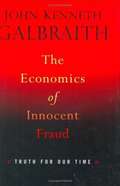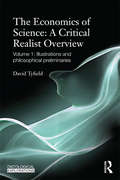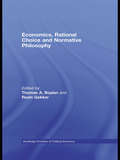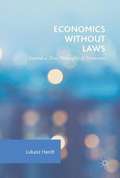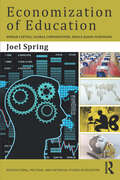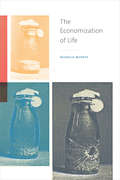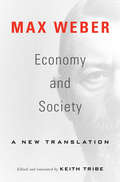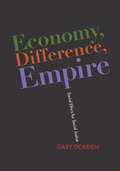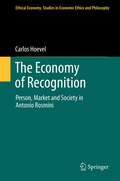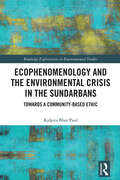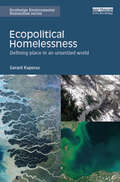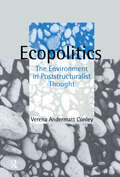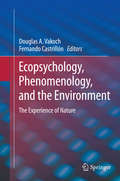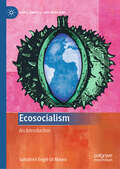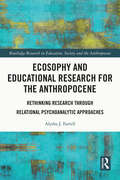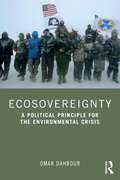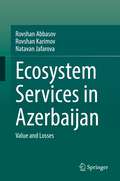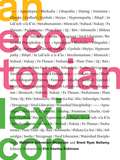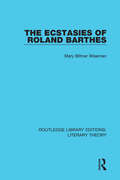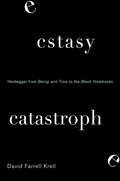- Table View
- List View
The Economics of Adam Smith
by Samuel HollanderThe renewed interest in the works of the great classical economists reflects in part a recognition that there is still much to be learned from them about the operation of the economy. This volume is the first in a series of four in which Professor Hollander will provide an analytical and critical assessment of the thought of the British school of classical economists; later volumes will elucidate the thought of Ricardo and Malthus, Mill, and Marx. This study relates Smith's theoretical position to contemporary history and economic practice. It pays particular attention to Smith's vision of the process of industrialization during the mid-eighteenth century, his approach to British colonial policies, and his view of the desirability of economic development. Coming in time for the bicentennial celebrations of The Wealth of Nations, this work should interest all economists with a sense of the evolution and purpose of their discipline, and should commend itself as a detailed and careful reinterpretation of what Adam Smith was thinking about. One authoritative reader has called it: 'one of the most distinguished essays in the history of economic thought of the last quarter century.' (Studies in Classical Political Economy)
The Economics of Centralism and Local Autonomy
by Phillip J. BrysonA comparative analysis of the process of public sector transition from central planning to market democracy. It is the story of the difficulties and complexities of moving to a system of greater autonomy for the subnational governments of the Czech and Slovak Republics, including the future of fiscal policies after the global recession.
The Economics of Education (Routledge Library Editions: Education)
by John SheehanThis book is a survey of the principal aspects of the economics of education, such as the demand for education as consumption and as an investment, good education and economic growth, education and manpower needs, and the finance of education. In some cases in recent years, economic theory has been applied to educational problems in order to gain an insight into the workings of the educational system. The result has been a certain amount of confusion and distrust among teachers and educationists: confusion because some theoretical aspects are not easily understood and distrust of the economist’s intrusion into educational policy-making. This book overcomes these problems by making minimal demands on prior knowledge of economics and by emphasizing the limitations of economic analysis applied to policy matters.
The Economics of Innocent Fraud: Truth for Our Time
by John Kenneth GalbraithThe primary aspect of the "fraud" of the American economy that Galbraith (emeritus, economics, Harvard U.) criticizes is the false pretense of shareholder control over corporations, when in fact all real power has shifted to corporate managers. Contradicting conventional wisdom, or "approved belief" in his words, he denies the distinction between the private and public sectors, describing how the managerial class has unprecedented power in the economy's public sector, including major influence over important policies of war or peace. In the end, the continuing references to an impersonal market are "a not wholly innocent fraud."
The Economics of Science: Volume 1: Illustrations and Philosophical Preliminaries
by David TyfieldDramatic and controversial changes in the funding of science over the past two decades, towards its increasing commercialization, have stimulated a huge literature trying to set out an "economics of science". Whether broadly in favour or against these changes, the vast majority of these frameworks employ ahistorical analyses that cannot conceptualise, let alone address, the questions of "why have these changes occurred?" and "why now?" Nor, therefore, can they offer much insight into the crucial question of future trends. Given the growing importance of science and innovation in an age of both a globalizing knowledge-based economy (itself in crisis) and enormous challenges that demand scientific and technological responses, these are significant gaps in our understanding of important contemporary social processes. This book argues that the fundamental underlying problem in all cases is the ontological shallowness of these theories, which can only be remedied by attention to ontological presuppositions. Conversely, a critical realist approach affords the integration of a realist political economy into the analysis of the economics of science that does afford explicit attention to these crucial questions; a ‘cultural political economy of research and innovation’ (CPERI). Accordingly, the book sets out an introduction to the existing literature on the economics of science together with novel discussion of the field from a critical realist perspective. In arguing thus across levels of abstraction, however, the book also explores how concerted engagement with substantive social enquiry and theoretical debate develops and strengthens critical realism as a philosophical project, rather than simply ‘applying’ it. Divided into two volumes, in this first volume the book explores the ‘top’ and ‘tail’ of the argument, regarding substantive and philosophical aspects. Starting with substantive illustrations, we explore the social challenges associated with the contemporary commercialization of science and the movement towards a knowledge-based bio-economy. Having shown the explanatory benefits of assuming a realist political economy perspective, the book then turns to the task of reconstructing and justifying that theoretical perspective. True to the overall argument regarding attention to ontological presuppositions, this starts with critical realism’s critique of mainstream economics but also develops critical realism itself towards what may be called a ‘transcendental constructivism’.
Economics, Rational Choice and Normative Philosophy (Routledge Frontiers of Political Economy #Vol. 116)
by Thomas A. Boylan Ruvin GekkerFollowing Amartya Sen’s insistence to expand the framework of rational choice theory by taking into account ‘non-utility information,’ economists, political scientists and philosophers have recently concentrated their efforts in analysing the issues related to rights, freedom, diversity intentions and equality. Thomas Boylan and Ruvin Gekker have gathered essays that reflect this trend. The particular themes addressed in this volume include: the measurement of diversity and freedom, formal analysis of individual rights and intentions, judgment aggregation under constraints and strategic manipulation in fuzzy environments. Some papers in the volume also deal with philosophical aspects of normative social choice.
Economics Without Laws: Towards a New Philosophy of Economics
by Łukasz HardtThis book offers a vision of economics in which there is no place for universal laws of nature, and even for laws of a more probabilistic character. The author avoids interpreting the practice of economics as something that leads to the formulation of universal laws or laws of nature. Instead, chapters in the book follow the method of contemporary philosophy of science: rather than formulating suggestions for practicing scientists of how they should do research, the text describes and interprets the very practice of scientific research. This approach demonstrates how economists can explain economic phenomena not by subsuming them under general laws, but rather by building models of these phenomena, by referring to causes, or even by investigating what is in the nature of given factors, events, or circumstances to produce.
Economization of Education: Human Capital, Global Corporations, Skills-Based Schooling (Sociocultural, Political, and Historical Studies in Education)
by Joel SpringIn this timely, cogent analysis of trends and powerful forces shaping global educational policy today, Joel Spring focuses on how economization is making economic growth and increased productivity the main goals of schools, and the ways these goals are achieved—including measuring educational policies by their costs and economic benefits, shaping family life to ensure productive workers and high-achieving students, introducing entrepreneurship education into curricula from preschool through higher education, and increasing the involvement of economists in educational policy analysis. Close attention is given to the Organization for Economic Cooperation and Development (OECD), the World Bank, the World Economic Forum, and multinational corporations, which, as advocates of economization, want schools to focus on teaching hard and soft skills needed by the global labor market. Economization raises questions about the effects of economically driven agendas for schools: Will education policies advocated by global organizations and multinational businesses corporatize and standardize human personalities and families? What type of global worker is being sought by global organizations and multinational corporations? What education programs are supported to educate the ideal global worker? What is the ideal family life for economic growth and development? Detailing and analyzing the politics and motivations driving economization, the book concludes with an assessment of the impacts of the confluence of business interests, economic theories, governments, and educators.
The Economization of Life
by Michelle MurphyWhat is a life worth? In the wake of eugenics, new quantitative racist practices that valued life for the sake of economic futures flourished. In The Economization of Life, Michelle Murphy provocatively describes the twentieth-century rise of infrastructures of calculation and experiment aimed at governing population for the sake of national economy, pinpointing the spread of a potent biopolitical logic: some must not be born so that others might live more prosperously. Resituating the history of postcolonial neoliberal technique in expert circuits between the United States and Bangladesh, Murphy traces the methods and imaginaries through which family planning calculated lives not worth living, lives not worth saving, and lives not worth being born. The resulting archive of thick data transmuted into financialized “Invest in a Girl” campaigns that reframed survival as a question of human capital. The book challenges readers to reject the economy as our collective container and to refuse population as a term of reproductive justice.
Economy and Society: A New Translation (People, Markets, Goods: Economies And Societies In History Ser. #Volume 10)
by Max WeberKeith Tribe’s new translation presents Economy and Society as it stood when Max Weber died. One of the world’s leading experts on Weber’s thought, Tribe has produced a clear and faithful translation that will become the definitive English edition of one of the few indisputably great intellectual works of the past 150 years.
Economy, Difference, Empire: Social Ethics for Social Justice (Columbia Series on Religion and Politics)
by Gary DorrienSourcing the major traditions of progressive Christian social ethics-social gospel liberalism, Niebuhrian realism, and liberation theology-Gary Dorrien argues for the social-ethical necessity of social justice politics. In carefully reasoned essays, he focuses on three subjects: the ethics and politics of economic justice, racial and gender justice, and antimilitarism, making a constructive case for economic democracy, along with a liberationist understanding of racial and gender justice and an anti-imperial form of liberal internationalism. In Dorrien's view, the three major discourse traditions of progressive Christian social ethics share a fundamental commitment to transform the structures of society in the direction of social justice. His reflections on these topics feature innovative analyses of major figures, such as Walter Rauschenbusch, Reinhold Niebuhr, James Burnham, Norman Thomas, and Michael Harrington, and an extensive engagement with contemporary intellectuals, such as Rosemary R. Ruether, Katie Cannon, Gregory Baum, and Cornel West. Dorrien also weaves his personal experiences into his narrative, especially his involvement in social justice movements. He includes a special chapter on the 2008 presidential campaign and the historic candidacy of Barack Obama.
Economy, Difference, Empire: Social Ethics for Social Justice
by Gary DorrienSourcing the major traditions of progressive Christian social ethics-social gospel liberalism, Niebuhrian realism, and liberation theology-Gary Dorrien argues for the social-ethical necessity of social justice politics. In carefully reasoned essays, he focuses on three broad subjects: the ethics and politics of economic justice; racial and gender justice; and anti-militarism, and makes a constructive case for economic democracy, a liberationist understanding of racial and gender justice, and an anti-imperial form of liberal internationalism. In Dorrien's view, the three major discourse traditions of progressive Christian social ethics share a fundamental commitment to transform the structures of society in the direction of social justice. His reflections on these topics feature extensive and innovative analyses of major figures, such as Walter Rauschenbusch, Reinhold Niebuhr, James Burnham, Norman Thomas, and Michael Harrington, and contemporary intellectuals, such as Rosemary R. Ruether, Katie Cannon, Gregory Baum, and Cornel West. Dorrien also weaves his personal experiences into his narrative, especially his involvement in social justice movements. The volume features a special chapter on Dorrien's published work during the 2008 presidential campaign and historic candidacy of Barack Obama.
The Economy of Recognition
by Carlos HoevelIntroducing an alternative philosophical foundation to the study of economics, this book explains and adopts the perspective of the Italian philosopher Antonio Rosmini (1797-1855), whose interpretation of economic action was fundamentally at odds with the prevailing and all-conquering utilitarianism of modernity. Rosmini, one of the most important Italian and Catholic philosophers of the modern age, eschewed the traditional concepts of subjectivism and individualism at the core of the utilitarian thesis, prefiguring today's critique of 'autistic economics' with his assertion that micro-economic formulae consecrating the 'maximization of utility' derive not from scientific principles or even hypotheses, but from uncritically adopted philosophical ideas. It was an assault on the determinism he perceived as the fatal flaw in accepted economic theory. Rosmini's notion of human and economic action, based on human beings' 'personal' capacities for objective knowledge, truth recognition, moral goodness and happiness, deeply transform the meaning of central economic activities such as labour, wealth creation and consumption, and become crucial factors in any analysis of the operation of the economy. After introducing the fundamentals of Rosmini's thought, the author details the theoretical and institutional features of utilitarian economics, tracing their influence on social norms. He juxtaposes these with Rosmini's alternative philosophy which places the concept of social justice at its heart, and which attempts to establish a framework for relations between the public and private realms. The contemporary case is then made for adopting Rosmini's principles, thus changing an economic paradigm widely held to be unassailable. The fruit of unprecedented and systematic research on Rosmini's economic ideas, this volume offers a detailed conceptual framework to guide alternative approaches to conventional neoclassical economics.
Ecophenomenology and the Environmental Crisis in the Sundarbans: Towards a Community-Based Ethic (Routledge Explorations in Environmental Studies)
by Kalpita Bhar PaulThis book offers a philosophical analysis of the environmental crisis in the Indian Sundarbans, drawing upon phenomenological narratives. It nuances the present understanding of the crisis by introducing plurality in our metaphysical understanding of the environment and epistemological understanding of the human–environment relationship.Contemporary research on the Sundarbans mainly focuses on the impending threat of climate change, natural disasters, as well as increasing human–animal conflict, conservation, and forest access debates, while scholarly works have mostly used environmental impact assessments to offer technocratic solutions that prioritize a particular type of human–environment relationship characterized by an "anticipation of ruin." Rather than rushing to find solutions, I embark on a journey to unpack the meaning of crisis through phenomenological narratives of human–environment relationships. A deep dive into the human–environment relationship through an intentional engagement with the work-worlds of islanders, the formation of a more-than-human community is revealed, giving rise to community-based ethic that transcends the poverty of thought and imagination in comprehending the crisis of the Indian Sundarbans. This new ethical framework emphasizes the co-emergence of self-consciousness and eco-consciousness, serving as a moral impetus for individuals to act ethically towards the environment. This approach impels us to rethink what the Sundarbans is, how the crisis gets manifested to the inlanders and outsiders, and what kind of procedural changes are required to protect the Sundarbans as a living ecosystem instead of a natural museum.The book’s phenomenological depth and engaged philosophical framework will elicit deep interest from within academia and among practitioners who are working in environmental studies, philosophy, human ecology, and island studies. The convergence of conceptual understandings and field narratives will also draw the interest of research students working in correlated fields.
Ecopolitical Homelessness: Defining place in an unsettled world (Routledge Environmental Humanities)
by Gerard KuperusWhile our world is characterized by mobility, global interactions, and increasing knowledge, we are facing serious challenges regarding the knowledge of the places around us. We understand and navigate our surroundings by relying on advanced technologies. Yet, a truly knowledgeable relationship to the places where we live and visit is lacking. This book proposes that we are utterly lost and that the loss of a sense of place has contributed to different crises, such as the environmental crisis, the immigration crisis, and poverty. With a rising number of environmental, political, and economic displacements the topic of place becomes more and more relevant and philosophy has to take up this topic in more serious ways than it has done so far. To counteract this problem, the book provides suggestions for how to think differently, both about ourselves, our relationship to other people, and to the places around us. It ends with a suggestion of how to understand ourselves in an eco-political community, one of humans and other living beings as well as inanimate objects. This book will be of great interest to researchers and students of environmental ethics and philosophy as well as those interested in the environmental humanities more generally.
Ecopolitics: The Environment in Poststructuralist Thought (Opening Out: Feminism for Today)
by Verena Andermatt ConleyEcopolitics is a study of environmental awareness - or non-awareness - in contemporary French theory. Arguing that it is now impossible not to think in an ecological way, Verena Andermatt Conley traces the roots of today's concern for the environment back to the intellectual climate of the late 50s and 60s.The author considers key texts by influential figures such as Michael Serres, Paul Virilio, Gilles Deleuze and Felix Guattari, Michel de Certeau, Hélène Cixous and Luce Irigaray. Ecopolitics rehabilitates some ecological components of French intellectual thought of the past thirty years, and reassesses French poststructural thinkers who explicitly deal with ecology in their work.
Ecopsychology, Phenomenology, and the Environment
by Douglas A. Vakoch Fernando CastrillónThis book seeks to confront an apparent contradiction: that while we are constantly attending to environmental issues, we seem to be woefully out of touch with nature. The goal of Ecopsychology, Phenomenology and the Environment is to foster an enhanced awareness of nature that can lead us to new ways of relating to the environment, ultimately yielding more sustainable patterns of living. This volume is different from other books in the rapidly growing field of ecopsychology in its emphasis on phenomenological approaches, building on the work of phenomenological psychologists such as Maurice Merleau-Ponty. This focus on phenomenological methodologies for articulating our direct experience of nature serves as a critical complement to the usual methodologies of environmental and conservation psychologists, who have emphasized quantitative research. Moreover, Ecopsychology, Phenomenology and the Environment is distinctive insofar as chapters by phenomenologically-sophisticated ecopsychologists are complemented by chapters written by phenomenological researchers of environmental issues with backgrounds in philosophy and geology, providing a breadth and depth of perspective not found in other works written exclusively by psychologists.
Ecosocialism: An Introduction (Marx, Engels, and Marxisms)
by Salvatore Engel-Di MauroThis book offers an extensive critical overview of eco-socialism, one of the most generative and significant aspects of contemporary debates within socialism. Marxism has played a foundational role in the development of ecosocialism since its inception and has also led to critical reflections on the 20th century Marxism and ecological interpretation of Marxist writings. Despite the relevance of ecosocialism to the pressing debates on the ecological crisis and the growing literature on ecosocialism, there has not been a comprehensive account on ecosocialism and its variations. This volume seeks to fill this important gap and to pave the way for a more systematic development of this emerging paradigm. The book not only engages with a critique of other non-socialist ecological schools of thought in defence of ecosocialism, but also provides a critical overview of debates within ecosocialism and of ecosocialism itself. The latter includes an appraisal of ecosocialism in Bolivarian Venezuela and the implications of current efforts in the People's Republic of China to build an ecological civilisation. Furthermore, the book contains a crucial discussion about the relation between eco-socialism and indigenous studies and movements.
Ecosophy and Educational Research for the Anthropocene: Rethinking Research through Relational Psychoanalytic Approaches (Routledge Research in Education, Society and the Anthropocene)
by Alysha J. FarrellProblematizing the aims of education in the Anthropocene, this text illustrates the value of relational psychoanalytic theory in the study and practice of education amidst the climate crisis. Illustrating how dominant educational theory fails to acknowledge climate precarity and the consequences of living beyond the Earth’s carrying capacity, Ecosophy and Educational Research for the Anthropocene calls for a reorientation of scholarship to decentre the human subject. The author discusses the evolution of intersubjective psychoanalysis to make a case for a turn to relational and psychoanalytically informed educational research. Chapters foreground areas for educational researchers to consider in pursuing intersubjective inquiries into the affective dimensions of curriculum and pedagogy to foster an emergence of eco-attunement and ecosophical educational research (EER). By framing an ecosophical approach, this book enables educational leaders, researchers and educators to fulfil their responsibility to engage in educational praxis which is contextually responsive, relationally attuned and recognizant that we cannot be studied apart from our connections to the planet.
Ecosovereignty: A Political Principle for the Environmental Crisis
by Omar DahbourIn this book, Omar Dahbour develops the idea of ecosystem sovereignty, calling for a reinterpretation of some essential concepts in political philosophy, including territoriality, self-determination, peoplehood, and sovereignty, in order to make the case for peoples’ rights to protect and maintain their natural environments. In doing so, he theorizes current and historical struggles against resource extractions and land grabs, especially by food sovereignty and indigenous rights movements.The basic idea of ecosovereignty is that peoples living in relation to particular ecosystems have a collective right to ultimate authority over those systems and the resources they contain—provided they manage them sustainably. Dahbour argues that this authority has a legitimacy that overrides that of larger states, at least with regard to matters of environmental management. Ecosovereignty claims may strengthen challenges by peoples to states and corporations seeking to control and transform lands and waters for development, against the wishes of their inhabitants. Dahbour hopes the idea will provide a powerful tool for halting extractivism and ecocide, along with the extreme violence that these processes use against farming, indigenous peoples, and nature.Connecting political and environmental philosophy in an innovative way, Ecosovereignty: A Political Principle for the Environmental Crisis will keep scholars and students informed about an increasingly important topic.
Ecosystem Services in Azerbaijan: Value and Losses
by Rovshan Abbasov Rovshan Karimov Natavan JafarovaThis book aims to draw readers' attention to the benefits once present nature in Azerbaijan. Over the past hundred years, much of this has been lost because of the neglect of the intrinsic values of nature by both managers and local authorities, and the overuse of natural resources. For example, oil pollution and overfishing in the Caspian Sea have almost destroyed its fish and caviar resources. In this volume, the authors distinguish between the concepts of "gain" and "income" and show readers that short-term benefits based solely on monetary income deprive people and nature itself of long-term, lasting value. The book provides readers with real historical information, discusses the interactions between humans and nature, and shows, with real data and trends, the consequences of anthropogenic activity on natural resources in Azerbaijan. The authors cover fish, water, forest, mountain, and pasture ecosystems, draw attention to the impacts that pollution and other forms of environmental degradation have had on these resources, and the show the impact that resource depletion on people’s livelihoods. The book is intended primarily for managers, policymakers, students, and academics, and will be of interest to natural scientists, historians, and students of culture.
An Ecotopian Lexicon
by Melody Jue Sam Solnick Randall Amster Daniel Worden Andrew Pendakis Sofia Ahlberg Allison Ford Kari Marie Norgaard Malcolm Sen Jennifer Lee Johnson Michael Horka Rebecca Evans Karen O'Brien Ann Kristin Schorre John Esposito Anthony Lioi Evelyn O'Malley Carolyn Fornoff Kira Bre Clingen Andrew Alan Johnson Miraim Tola Charis Boke Yifei Li Pierre-Héli Monot Andrew Hageman Brent Ryan Bellamy Sheena Wilson Janet Tamalik McGrath Kimberly Skye Richards Robert Savino Oventile Chris Pak David N. Pellow Cherice Bock Kim Stanley RobinsonPresents thirty novel terms that do not yet exist in English to envision ways of responding to the environmental challenges of our generation As the scale and gravity of climate change becomes undeniable, a cultural revolution must ultimately match progress in the realms of policy, infrastructure, and technology. Proceeding from the notion that dominant Western cultures lack the terms and concepts to describe or respond to our environmental crisis, An Ecotopian Lexicon is a collaborative volume of short, engaging essays that offer ecologically productive terms—drawn from other languages, science fiction, and subcultures of resistance—to envision and inspire responses and alternatives to fossil-fueled neoliberal capitalism. Each of the thirty suggested &“loanwords&” helps us imagine how to adapt and even flourish in the face of the socioecological adversity that characterizes the present moment and the future that awaits. From &“Apocalypso&” to &“Qi,&” &“ ~*~ &“ to &“Total Liberation,&” thirty authors from a range of disciplines and backgrounds assemble a grounded yet dizzying lexicon, expanding the limited European and North American conceptual lexicon that many activists, educators, scholars, students, and citizens have inherited. Fourteen artists from eleven countries respond to these chapters with original artwork that illustrates the contours of the possible better worlds and worldviews.Contributors: Sofia Ahlberg, Uppsala U; Randall Amster, Georgetown U; Cherice Bock, Antioch U; Charis Boke, Cornell U; Natasha Bowdoin, Rice U; Kira Bre Clingen, Harvard U; Caledonia Curry (SWOON); Lori Damiano, Pacific Northwest College of Art; Nicolás De Jesús; Jonathan Dyck; John Esposito, Chukyo U; Rebecca Evans, Winston-Salem State U; Allison Ford, U of Oregon; Carolyn Fornoff, U of Illinois at Urbana-Champaign; Michelle Kuen Suet Fung; Andrew Hageman, Luther College; Michael Horka, George Washington U; Yellena James; Andrew Alan Johnson, Princeton U; Jennifer Lee Johnson, Purdue U; Melody Jue, U of California, Santa Barbara; Jenny Kendler; Daehyun Kim (Moonassi); Yifei Li, NYU Shanghai; Nikki Lindt; Anthony Lioi, Juilliard School of New York; Maryanto; Janet Tamalik McGrath; Pierre-Héli Monot, Ludwig Maximilian U of Munich; Kari Marie Norgaard, U of Oregon; Karen O&’Brien, U of Oslo, Norway; Evelyn O&’Malley, U of Exeter; Robert Savino Oventile, Pasadena City College; Chris Pak; David N. Pellow, U of California, Santa Barbara; Andrew Pendakis, Brock U; Kimberly Skye Richards, U of California, Berkeley; Ann Kristin Schorre, U of Oslo, Norway; Malcolm Sen, U of Massachusetts Amherst; Kate Shaw; Sam Solnick, U of Liverpool; Rirkrit Tiravanija, Columbia U; Miriam Tola, Northeastern U; Sheena Wilson, U of Alberta; Daniel Worden, Rochester Institute of Technology.
The Ecstasies of Roland Barthes (Routledge Library Editions: Literary Theory #26)
by Mary Bittner WisemanIn this book, first published in 1989, Mary Bittner Wiseman interprets Roland Barthes’s experiments as efforts to reposition the human subject with respect to language and to time in order to let the subject escape from the language of a particular culture and the present time. With her insistent pushing against the boundaries of our standard academic assumptions, Mary Bittner Wiseman succeeds in interpreting Barthes’s effort to join the traditional and the new. This title will be of interest to students of literature and philosophy.
The Ecstasies of Roland Barthes (Routledge Library Editions: Literary Theory)
by Mary Bittner WisemanIn this book, first published in 1989, Mary Bittner Wiseman interprets Roland Barthes’s experiments as efforts to reposition the human subject with respect to language and to time in order to let the subject escape from the language of a particular culture and the present time. With her insistent pushing against the boundaries of our standard academic assumptions, Mary Bittner Wiseman succeeds in interpreting Barthes’s effort to join the traditional and the new. This title will be of interest to students of literature and philosophy.
Ecstasy, Catastrophe: Heidegger from Being and Time to the Black Notebooks (SUNY series in Contemporary Continental Philosophy)
by David Farrell KrellIn Ecstasy, Catastrophe, David Farrell Krell provides insight into two areas of Heidegger's thought: his analysis of ecstatic temporality in Being and Time (1927) and his "political" remarks in the recently published Black Notebooks (1931–1941). The first part of Krell's book focuses on Heidegger's interpretation of time, which Krell takes to be one of Heidegger's greatest philosophical achievements. In addition to providing detailed commentary on ecstatic temporality, Krell considers Derrida's analysis of ekstasis in his first seminar on Heidegger, taught in Paris in 1964–1965. Krell also relates ecstatic temporality to the work of other philosophers, including Aristotle, Augustine, Kant, Schelling, Hölderlin, and Merleau-Ponty; he then analyzes Dasein as infant and child, relating ecstatic temporality to the "mirror stage" theory of Jacques Lacan.The second part of the book turns to Heidegger's Black Notebooks, which have received a great deal of critical attention in the press and in philosophical circles. Notorious for their pejorative references to Jews and Jewish culture, the Notebooks exhibit a level of polemic throughout that Krell takes to be catastrophic in and for Heidegger's thought. Heidegger's legacy therefore seems to be split between the best and the worst of thinking—somewhere between ecstasy and catastrophe.Based on the 2014 Brauer Lectures in German Studies at Brown University, the book communicates the fruits of Krell's many years of work on Heidegger in an engaging and accessible style.
